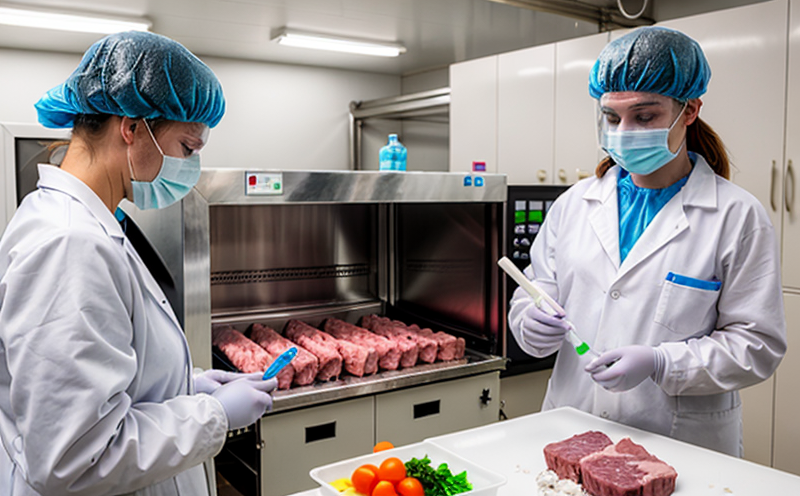EN 15789 Vibrio Detection in Meat & Fermented Products
The CEN-approved standard EN 15789 specifies the methodology for detecting Vibrio spp. in meat and fermented products, ensuring that producers meet regulatory requirements and maintain product safety. This testing is crucial as Vibrio bacteria can cause serious foodborne illnesses if present in significant quantities.
Vibrio species are known to thrive under certain environmental conditions, particularly in warm climates or fermented products. The standard outlines a rigorous procedure for sampling and testing that ensures accurate detection of Vibrio spp., allowing stakeholders to take corrective actions before contamination becomes a public health concern.
The first step involves the collection of samples from raw meat and fermented products, which are then prepared in accordance with EN 15789 specifications. This preparation includes homogenization and enrichment cultures that enhance the detectability of Vibrio spp. The standard recommends using selective media such as Cetrimide agar for isolation and confirmation.
The testing process is conducted under controlled conditions to ensure precision and reliability. Laboratories accredited in accordance with EN 15789 employ advanced microbiological techniques, including quantitative polymerase chain reaction (qPCR) and culture-based methods, to identify Vibrio spp. The qPCR method provides a rapid and sensitive means of quantifying target organisms, while the culture-based approach allows for species identification.
The results from these tests are reported with clear metrics that include colony-forming units per gram (CFU/g) or CFU/mL, depending on the sample type. Reporting is aligned with international standards such as ISO 16866 and EN ISO 21528-4 to ensure consistency and comparability across different laboratories.
Quality assurance in this process involves regular calibration of instruments and equipment used for testing, adherence to standard operating procedures (SOPs), and ongoing training for laboratory personnel. This ensures that results are accurate and reliable, meeting the stringent requirements set forth by EN 15789.
The importance of this test cannot be overstated in maintaining public health. The presence of Vibrio spp. can lead to serious foodborne illnesses such as gastroenteritis or more severe conditions like cholera, especially when the bacteria reach high concentrations. Therefore, strict adherence to EN 15789 is essential for meat and fermented product manufacturers.
In conclusion, the testing method prescribed by EN 15789 provides a robust framework for detecting Vibrio spp. in meat and fermented products. By following this standard, laboratories can ensure that samples are processed accurately and reported reliably, thus helping to protect public health and compliance with regulatory requirements.
Eurolab Advantages
Comprehensive Expertise: Eurolab boasts a team of highly experienced microbiologists who specialize in the detection of Vibrio spp. This expertise ensures that our testing is accurate and reliable, meeting stringent international standards.
State-of-the-Art Facilities: Our laboratories are equipped with advanced instrumentation and facilities for sample preparation and analysis. This includes qPCR machines, incubators, and other essential tools necessary for the precise execution of EN 15789.
Innovative Methods: Eurolab continuously invests in research and development to stay at the forefront of microbiological testing methodologies. Our innovative approaches ensure that we can offer the most up-to-date methods for detecting Vibrio spp., providing accurate results even when dealing with low concentrations.
Dedicated Customer Support: Eurolab provides comprehensive support to our clients, ensuring they receive clear and concise reports tailored to their specific needs. Our customer service team is available to answer any questions or provide additional information about the testing process.
Comprehensive Compliance: By adhering strictly to EN 15789, Eurolab ensures that all tests are conducted in compliance with international standards. This guarantees that our results are accepted worldwide and meet regulatory requirements.
Consistent Quality: Our laboratories maintain a high level of quality through regular calibration of instruments, adherence to standard operating procedures (SOPs), and ongoing training for laboratory personnel. This commitment to consistency ensures accurate and reliable results every time.
Quality and Reliability Assurance
- Sophisticated Equipment: Eurolab utilizes advanced microbiological equipment, including qPCR machines and incubators, which are essential for the accurate execution of EN 15789.
- Standard Operating Procedures (SOPs): Strict adherence to SOPs ensures that every step in the testing process is conducted consistently and accurately.
- Continuous Training: Eurolab personnel undergo regular training to ensure they are up-to-date with the latest methodologies and techniques for detecting Vibrio spp.
- Regular Calibration: Instruments used in testing are regularly calibrated to maintain accuracy and reliability.
- Sample Preparation: Samples are prepared in accordance with EN 15789 specifications, ensuring that the detection process is as accurate as possible.
International Acceptance and Recognition
The testing method prescribed by EN 15789 is widely recognized and accepted internationally. Laboratories accredited in accordance with this standard are trusted to provide reliable results that meet regulatory requirements and industry standards.
In many countries, including those within the European Union (EU), the United States, Canada, and others, laboratories must follow international standards like EN 15789 to ensure their testing is recognized. This ensures that meat and fermented product manufacturers can confidently rely on the results of these tests when making decisions about the safety of their products.
The acceptance of EN 15789 extends beyond national boundaries, as it aligns with global initiatives aimed at improving food safety and public health. By adhering to this standard, laboratories contribute to a safer global food supply chain.





